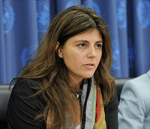Published on Wed, 2012-05-23 08:34
The Economic Justice Network (EJN), a coalition of Ghanaian civil society organizations, has cautioned African countries involved in the negotiation of the Economic Partnership Agreements not to succumb to the pressure from European Union to sign the agreement as it has the potential of disintegrating the regional economies, reported several communications media. |
Published on Tue, 2012-05-22 18:39
The Egyptian Association for Community Participation Enhancement (EACPE, focal point of Social Watch in the Arab country) said it would not monitor the presidential elections this week because of the restrictions placed on non governmental organizations by the government. |
Published on Thu, 2012-05-17 08:57
A large group of Arab NGO Network for Development (ANND) members and partners is visiting Washington this week to express the positions and perspectives of civil society organizations from Middle East and North Africa on the United States foreign policy towards the region. Twelve activists and experts representing ten countries (Egypt, Tunisia, Palestine, Lebanon, Jordan, Morocco, Bahrain, Yemen, Sudan, and Iraq) are also seizing the opportunity to enhance spaces for the dialogue between Arab groups and US civic stakeholders and policy makers. |
Published on Thu, 2012-05-17 08:55
A group of United Nations independent experts urged the European Union (EU) to take the lead in promoting the adoption of a global financial transaction tax (FTT) to offset the costs of the enduring economic, financial, fuel, climate and food crises, and to protect basic human rights. |
Published on Thu, 2012-05-17 08:52
More than 160 human rights organizations, among them Terre des Hommes, Caritas Europa, Amnesty International and Human Rights Watch, has signed the appeal “Not crossing red lines-A negotiators’ checklist on minimum detention safeguards”, insisting that EU institutions ensure respect for asylum seekers’ right to liberty in recast Reception Conditions Directive and Dublin Regulation. |








